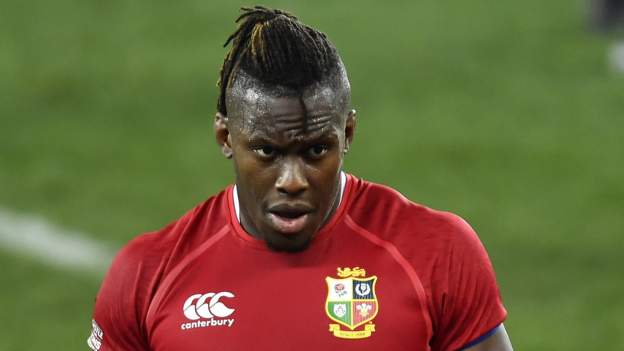
Second row Maro Itoje has warned his British and Irish Lions team-mates to take heed of previous tours and expect a strong response from South Africa in Saturday's second Test.
"We're happy but we know that we need to be better and stronger," said the 26-year-old Saracens lock.
"The Springboks.... we know they are coming."
Itoje added: "We're learning lessons so I think there is more to come from us, but the onus is on us to look at what we've done."
The Lions found themselves 12-3 behind to the world champions at the break before hooker Luke Cowan-Dickie's try helped change the tide and lay the foundations for a resilient second-half display.
However, while Warren Gatland's side got off to the ideal start in their pursuit of a first series win in South Africa since 1997, Itoje used the 2001 tour of Australia as proof that winning the opener can sometimes prove a false dawn.
Twenty years ago, Graham Henry's side crushed Australia in the opening match only to lose the series 2-1.
"Obviously this was a great win, but I'm a man who likes to look at history and see how other tours have unfolded," added the three-time Six Nations winner, echoing BBC Sport columnist Matt Dawson.
"Looking at the 2001 Tests in Australia, they won the first Test quite convincingly and then went on to lose the next two.
"Winning a Test match with the Lions is rare. We only play once every four years and it's unique, but this win will mean nothing unless we go out and win next weekend.
"So while this is a great win I'm proud to be part of, we know that we need to do a job next weekend. That's when it really counts."
While Itoje expressed pride in how the Lions snatched victory from the jaws of defeat, he said they struggled to reach the required intensity during the first half in Cape Town and were guilty of conceding "a lot of silly penalties".
"The first half we came out with a decent intensity but not probably the intensity we needed to," he said.
"But most importantly, or to our detriment, we were giving away a lot of silly penalties, we weren't really being as disciplined as we needed to be.
"And the second half we just flipped it on its head, we came out with a higher intensity and we kept our discipline a lot more and as a result we were able to put more pressure on them.
"At half-time we just had to trust ourselves a bit more, trust our systems and increase the intensity.
"Often when you're in that situation you have two choices - either continue what you're doing and just watch the scoreboard get away from you or put up your sleeves and try and turn it around. We tried to do the latter and fortunately for us it was successful."















 Phone: (800) 737. 6040
Phone: (800) 737. 6040 Fax: (800) 825 5558
Fax: (800) 825 5558 Website:
Website:  Email:
Email: 






